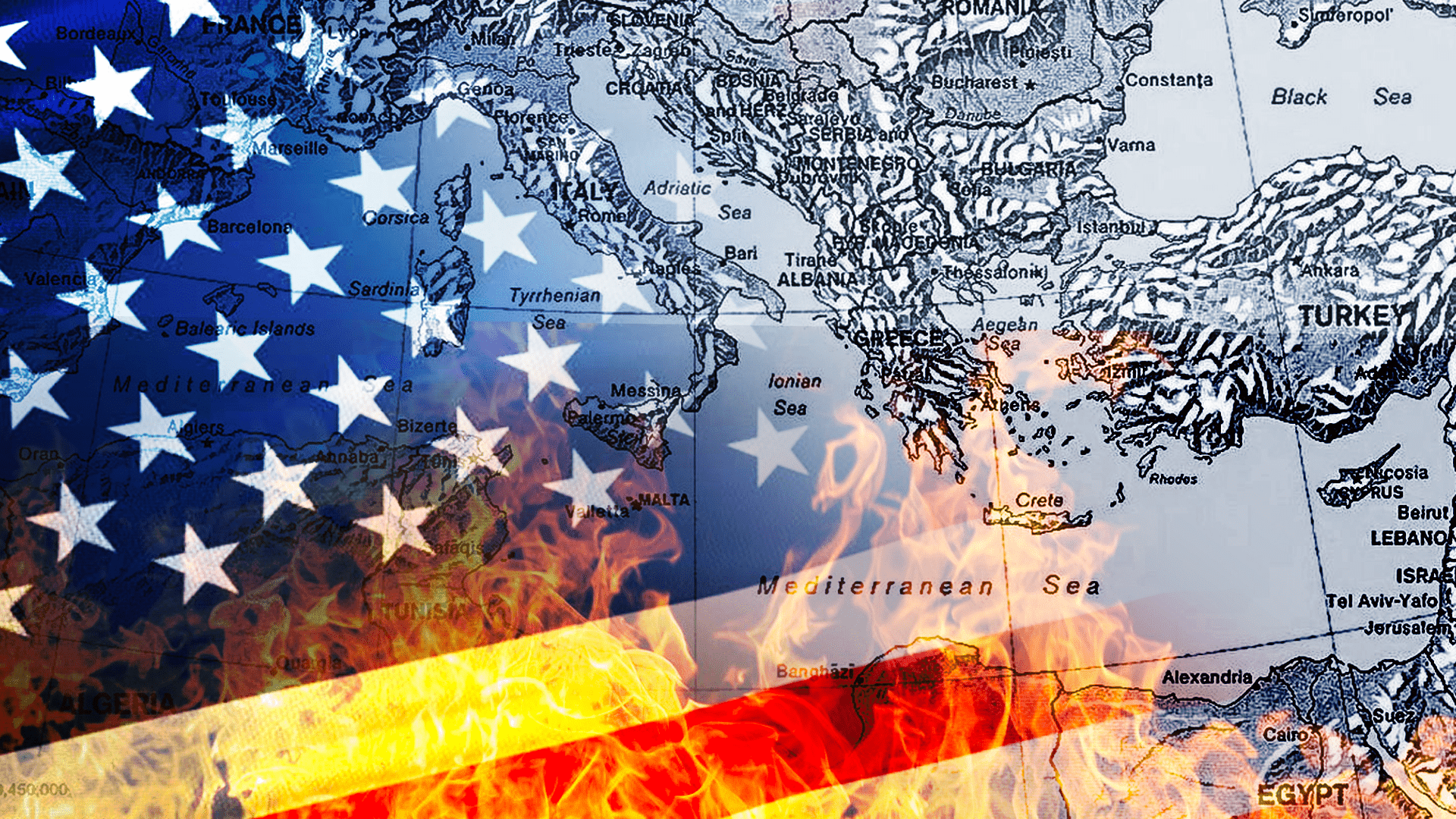The recent presidential elections clearly showed that the United States is incapable of even playing the cheap game of projecting itself as a “democracy” and keeping its two party system functioning properly.
The results show that the “democracy” which Washington has been trying to export to other countries is not even functioning at home.
The polarization in the US is a structural characteristic which has been growing on socio-economic foundations, and will only deepen with the ongoing economic depression which is hitting the United States.
As a result of a “divergence from the democratic traditions of the US”, even Donald Trump and his administration will not be able to heal the problems that are spiraling into a real social outburst.
In short, the genie has already been released from the lamp, Pandora’s box has been opened, and cannot be closed.
There are many around the world preparing for the possibility that the United States will go on another offensive and solidify its broken global hegemony after Joe Biden solidifies his government.
Before evaluating what Biden can or cannot do in our region, we need to remind those who believe that the Atlantic-based New World Order will be restored of the evaluation made in “The Eighteenth Brumaire of Louis Bonaparte” by Karl Marx;
“Hegel remarks somewhere that all great, world-historical facts and personages occur, as it were, twice. He has forgotten to add: the first time as tragedy, the second as farce.”
Although there are many moments where Donald Trump Administration has diverged away from the traditional US policies, these four points are particularly important, as they are in a sense related to Turkey as well:
1. Following a proxy war model instead of direct intervention in the Middle East,
2. A distant stance towards the EU and the NATO,
3. Maintaining lower-tensions in relations with Russia,
4. An aggressive policy against China.
Some evaluations suggest that Joe Biden will push America back to the country’s traditional policies in regard to these issues.
IS IT POSSIBLE FOR THE UNITED STATES TO DEVELOP A MORE DOMINATING POLICY IN THE MIDDLE EAST?
Biden, unlike Trump, wants to increase US pressure in the Middle East, especially in Syria.
We first need to stress that no matter which candidate is elected in the United States, the primary goal in the Middle East is to prevent China and Russia from taking an active role in the region.
The United States relies on three key dynamics to achieve this goal;
1. Keeping the region in a state of “constant instability”. Creating economic crises, social uprisings and small, medium or larger conflicts and wars
It is possible that Joe Biden, who will predominantly work with the administrators from Obama administration, to follow a policy that provokes instability at the breaking points in the region through NGOs which come into play via the activities of the fifth column, the mainstream media and all other kinds of legal or illegal organizations, unlike Trump, who chooses to pursue his policies through direct contact with the foreign governments.
Syria and Iraq make up the soft underbelly in the region. The resignation of James Jeffrey, the Special Representative for Syria Engagement of the United States after the election, shows that the Biden administration is likely to pursue a new policy against Syria.
The United States is likely to use the PKK and ISIS or their counterparts more actively in Syria and in Iraq\ in the near future.
However, if Turkey, Russia and Iran continue to collaborate in a similar way to the Astana process, the United States will not be able to intervene directly in these regions.
On the other hand, the statesmen, bureaucrats and leading figures of Eurasian and Middle Eastern countries which are currently attempting to improve their relations with China and Russia to balance the United States’ influence in the region, will likely be targeted by the Biden administration.
2. Maintaining full control over the energy resources and energy routes in the region, and especially in the Eastern Mediterranean and in the Persian Gulf
At this point, it is likely that the already existing polarization in the Eastern Mediterranean will be deepened, and that the coalition of Greece, Greek Cyprus, Israel and the Gulf countries will be more openly supported by the United States against Turkey.
The provocations against Turkey and/or Iran by these countries will likely be supported.
On the other hand, the Saudi Arabian government is likely to deal with internal turmoil and similar threats which at some points tends to move away from the United States after the constant implementation of carrot and stick approach against the Gulf monarchies.
An American rapprochement for Qatar, which has been left isolated in the Gulf region, and steps to undermine relations between Turkey-Qatar-Iran, can be expected in this aspect.
There are some signs that the Muslim Brotherhood, which has been expulsed away during the Trump administration, will again be supported at some point, just as it was during Hillary Clinton’s term in the State Department.
3. Maintaining the security of Israel
There are two different approaches in this context, one being a strategy to reduce pressure on Israel through a deal with Iran, as happened during the Obama administration, or another to protect Tel Aviv by deploying military and economic pressures on Iran and its allies in the region.
Given that he is likely to work with the officials of the Obama administration, it seems possible that Biden, unlike Trump, will choose negotiations with Iran.
Of course, these policies will not be pursued as a token of Biden’s love for Iran, but solely as a part of the policies to ensure Israel’s security through diplomatic means.
In case such a process is initiated with Iran, a more moderate alternative like Yitzhak Rabin can be expected to replace Netanyahu, whose presidential seat is already at stake in Israel.
As long as the cooperation between the countries in the region, especially among Turkey-Russia and Iran deepens, such steps from Biden that are listed above, will become tougher to achieve.
The steps taken by Turkey and Russia in order to shift the Gulf countries away from the United States are highly critical in this process.
THE US-EU-NATO TRIANGLE
CNN’s announcement that Biden had been selected as president was welcomed with joy by many EU leaders.
Messages of congratulations came one by one.
The Trump administration has often been accused of betraying the Atlantic Alliance and leaving the old continent at the hands of Russia and China because of its distant policy against the EU and NATO.
Biden is expected to pursue policies that lean more towards the traditional Atlantic axis, and is expected to get the country back at the course of NATO.
However, we must also keep in mind that the current world is no longer the old world, and that the Eurasianist movements within the EU have been gaining strength.
Italy and Spain, as well as some other Eastern European and Balkan countries, have been taking a direction towards Russia and China, in Europe.
There are significant cliques within both the government and the opposition groups that advocate keeping good ties towards the Eurasian front, even in countries like France and Germany.
Therefore, it does not seem possible for the United States to act on the role of Europe’s savior, as was the case after World War II.
When it comes to NATO, there are still some controversies between Turkey and other member states that are difficult to rebuild.
Relations between Turkey and NATO will be a subject which Biden will have to make some critical choices in the near future.
A MORE AGGRESSIVE FOREIGN POLICY AGAINST RUSSIA
The alleged close ties between Putin and Trump were a central argument during Biden’s election campaign.
Biden, who has frequently accused Trump of being a Russian collaborator, is expected to pursue more aggressive policies against Moscow.
North Africa through Libya, the Balkans, the Caucasus, the Middle East, Central Asia and, of course the Eastern Europe, stand out as the regions where Russia will be targeted.
Other than the traditional US policies that mainly focus on creating instability through color revolution attempts and conflicts on civil wars and downfalls, disturbing the Russian-Turkish-Iranian relations in these regions can also be expected as a step taken to isolate Russia.
However, a strong attitude by the Ankara-Moscow and Tehran axis will surely thwart these efforts.
The defeat of the Western-backed government in Armenia is an example to this.
Once again, relations between Ankara and Moscow can be expected to strengthen and the areas of cooperation to be extended further during this process.
HOW WILL THE US-CHINA RELATIONS BE SHAPED?
Trump has pursued some harsh policies against China, especially during the final months of his office term.
The fact that news reports of Biden’s election victory being welcomed positively among the Chinese media also points to this fact.
Similar to the Kissinger era, Biden is likely to take the US-China relations forward with a strategy similar to the “Ping-Pong diplomacy”, in order to isolate Russia and try to gain supremacy in Eurasia.
But of course, the necessity to defend the interests of the American companies against China, which has emerged as a global power, stands as an obstacle in the way of the Biden administration.
It is also possible for the United States to realize initiatives with China today that give compromises similar to those given for the Soviet Russia during the Yalta and the Potsdam Conferences, which took place after World War II, in order to reach a rapprochement. Of course, the decisive thing will be which policies China will pursue on the global scale, as well as events that will take place in the context of Moscow-Beijing relations.
The evolution of the cooperation between Moscow and Beijing into a political and an economic bloc would surely make the Biden administration’s efforts futile in this context.
The chessboard is laden with many possibilities, there are still many possible moves available.
Biden will do his best to maintain pressure in the countries where Russian and Chinese interests are being challenged.
However, wherever Asia and Eurasia are able to pursue holistic policies, the game which has been going on since the 1800s played Mahan, Kissinger and Brzezinski, will finally be over.
















Leave a Reply